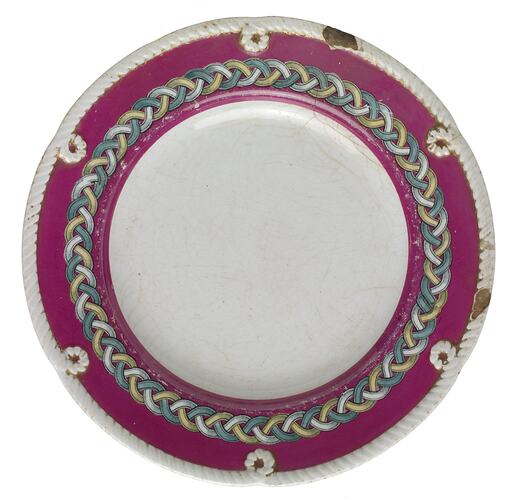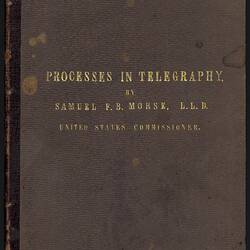The 'Age', 19 April 1887, p. 5; The 'Leader', 23 April 1887, p. 38 DEATH OF MR. S. W. M'GOWAN
The many friends of Mr. S. W. M'Gowan, Deputy Postmaster-General, will learn with surprise and regret of his death, which took place at a quarter-past 9 o'clock last night at the George Hotel, St. Kilda. Mr. M'Gowan only returned to the colony on Saturday by the P. and O. steamer Shannon, after spending his leave of absence, which extended over 12 months, in traveling through England and America and visiting some of the leading cities on the continent. During the early portion of the return voyage to the colony he suffered from congestion of the liver and other internal derangements, but on reaching the warmer climate of the Indian Ocean he appeared to improve in health. The improvement, however, was more apparent than real, for, upon the arrival of the Shannon, he was far from being well. Notwithstanding his illness he resumed his duties as Deputy Postmaster-General, but was only one day in office when he was compelled to relinquish work. He rapidly became worse, medical aid was called in, and he was attended by Dr. Williams and Dr. Cowper Johnstone, who advised that his only chance of recovery was by the performance of an operation. Accordingly Mr. Girdlestone yesterday morning performed the operation, with the assistance of Drs. Williams and Johnstone. The operation was successfully performed, but the constitution of the patient had become greatly weakened by illness, and Mr. M'Gowan gradually sank and died as stated above. In the early portion of the day a telegram was forwarded to Mrs. M'Gowan, in Sydney, acquainting her of the dangerous condition of her husband, and she replied that she would leave by the overland express which departed from Sydney at 5 o'clock yesterday afternoon. Mr. M'Gowan was born on the 4th of January, 1829, and was the eldest son of the late Samuel M'Gowan, of Kingston, Ontario, Canada. He was educated at the Midland District Grammar School, Kingston, and was intended for the legal profession. He studied law at Toronto between the years 1843 and 1847. In the latter year his father died. It was at this time that he attended a course of lectures on natural science, and eventually became a telegraphic student under the late Professor Morse, the inventor of the Morse system of telegraphy, from whom Mr. M'Gowan held high testimonials as to his abilities. He subsequently entered the service of the Toronto and Buffalo Electro-Magnetic Telegraph Company, the Montreal Telegraph Company, and the New York, Albany and Buffalo Telegraph Company, until late in 1852, when he migrated to Australia and landed at Melbourne from the ship Glance, from New York, early in 1853. He came with the intention of forming a private telegraph company for the purpose of establishing and working lines of telegraph to Sydney, Adelaide, Ballarat, Sandhurst and other important centres of population in the interior. To this end he brought with him an experienced telegraphist, together with a supply on instruments, batteries and other telegraphic materials; but found, after a lapse of several months occupied in negotiations with leading capitalists, that the Government had decided on assuming the proprietary of all telegraph lines to be constructed within the colony, a determination which culminated in a Gazette notice inviting tenders for the construction of a line of telegraph between Melbourne and Williamstown in September, 1853. Mr. M'Gowan subsequently submitted offers for the work named, and they were accepted by the then Governor, his Excellency C. J. Latrobe, and the contract was carried out in a satisfactory manner. Communication between the two places was established in January, 1854, but it was not fully opened to the public until the 1st March of the same year. About that period the Telegraph Statute framed by the Attorney-General, Mr. (now Sir William) Stawell, became law. The act was based upon the Telegraph Act of Canada, a copy of which Mr. M'Gowan brought to the colony with him. The short line from Melbourne to Williamstown was the first line of telegraphic communication south of the equator, and the system thus originated has not only grown to vast proportions throughout the colony, but has formed the basis upon which all other telegraphic systems have been established in the adjoining colonies, as well as in Tasmania and New Zealand. The Electric Telegraph department was placed under the charge of Mr. M'Gowan, who was subsequently appointed superintendent-general of telegraphs. In March, 1869, the Government amalgamated the Postal and Telegraph departments, and from that time up to the beginning of 1885, when he succeeded Mr. Jackson as Deputy Postmaster-General, Mr. M'Gowan held the office of inspector of post and telegraph services and superintending officer of telegraph construction. For some time he fulfilled the position of captain in the Torpedo Corps. Early in 1885 Mr. Jackson, the Deputy Postmaster-General, was appointed Government Auditor to succeed the late Mr. Agg, who was invested with the position of Railway Commissioner. Mr. M'Gowan was selected to take the position vacated by Mr. Jackson, and continued to fulfil the duties of the office until a year ago, when, after 33 years service, he was granted 12 months leave of absence on full pay. Prior to his departure the Postmaster-General, Mr. Derham, anxious to obtain the fullest information upon the last improvements adopted in regard to telephone and telegraph communication in England, America and the Continent, requested Mr. M'Gowan to take particular notice of the new order of things, and furnish him with a report thereon. This Mr. M'Gowan promised to do, and on his return to the colony last week was in the possession of voluminous notes, from which he intended to write his report. On the 30th June, 1857, Mr. M'Gowan married eldest daughter of the late Major Henry William Benson, O. M., of Kingston, Ontario, Canada. He leaves two sons and two daughters.
The 'Argus', Tuesday, April 19, 1887 DEATH OF THE DEPUTY POSTMASTER-GENERAL
It is with regret that we have to announce the death of Mr. S. W. McGowan, deputy postmaster-general, which occurred at the George Hotel, St. Kilda, early yesterday evening. Mr. McGowan only returned from a twelvemonth's tour through Great Britain, Europe, and America, on Saturday, the 9th inst., and as he was apparently in the best of health when he landed, his decease was both sudden and unexpected. The day after his arrival he complained of slight indisposition, but on the following Wednesday his illness appeared to be of so trifling a character that he paid an official visit to the Postmaster-General during the course of the forenoon at the General Post office. Towards the evening, however, the symptoms of his disorder, and as he subsequently grew gradually worse he was compelled to confine [himself to his room and seek ??] medical advice. It was then discovered that he was suffering from congestion of the liver and other disorders of a complicated nature. Remedial measures were adopted, and although Drs. Williams and Girdlestone were called in to consult with Dr. Coupar Johnson, Mr. McGowan gradually sank, and died at 9 o'clock last night. The deceased gentleman was the eldest son of the late Mr. S. McGowan, of Kingston, Ontario, Canada, and was born on January 4, 1829. He was educated at the Midland District Grammar School, Kingston, and subsequently studied for the legal profession, but owing to the death of his father he abandoned law in favour of science. He became a pupil of the late Professor Morse, the inventor of the Morse system of telegraphy, and under him made himself thoroughly acquainted with the whole of the details of the working of the electric telegraph.. He subsequently widened his experience by accepting engagements with several telegraph companies in Canada and the United States. In 1852, when the news of the gold discoveries in Victoria had begun to be circulated, Mr. McGowan, acting on the advice of his old instructor, Professor Morse, determined to venture to Australia. At the suggestion of the same eminent authority he decided to bring with him to the colonies a complete equipment of telegraph instruments and a first-class electrician. The voyage to Australia was made in the ship Glance, and after a somewhat lengthy passage Mr. McGowan landed in Melbourne early in the year 1853. No telegraph then existed in the colony, and Mr. McGowan, appreciating the value of establishing communication between the goldfields and Melbourne, opened negotiations with a few influential capitalists with the view to floating a company to erect lines between Sandhurst and Ballarat and Melbourne, and subsequently to the capitals of the adjoining colonies. When the venture appeared to have every chance of a successful issue the Government intervened. At first disinclined to accept the responsibility of availing themselves of the discoveries of Professor Morse, they at length recognised their great utility and worth. Mr. McGowan and his fellow speculators were then informed that should they form a company their application for authority to build lines would be resisted to the utmost. At the same time overtures were made to Mr. McGowan to join the public service. Finally Governor Latrobe solicited an interview with him, and at the meeting offered to give him control of the state system of telegraphs if he would accept an engagement from the Government. With nothing but the prospect of great opposition from the authorities if he did not agree to their terms, Mr. McGowan after a few days' deliberation signified to His Excellency his willingness to accept state employ. In the meantime the Government had issued tenders for the construction of a line of telegraph between Williamstown and Melbourne, and a contract was entered into by Mr. M'Gowan to complete the work, which he did to the satisfaction of the authorities. To him, therefore, belongs the honour of having not only been one of the first men in Victoria to direct public attention to the immense possibilities of telegraphy, but also of having taken the first step to bring the system into operation in the colony, if not in the whole of Australasia. The line from Williamstown was completed in January, 1854, and thrown open to the use of the public in March of the same year. The Government, however, could not legally charge for the transmission of messages until after the passage of the Electric Telegraph Bill, the second reading of which was moved on 31 March of that year by the then Attorney-General, Sir William F. Stawell. It was at this time that the control of the new department was vested in Mr. M'Gowan, to whom it was a matter of great pride that he should have been thus intimately associated with its creation. From 1854 until 1869 Mr. M'Gowan acted as superintendent of telegraphs, and it was under his personal supervision and direction that the majority of the lines radiating from Melbourne to every part of the colony were constructed.When in 1869 the Government decided, for the purpose of promoting the efficiency of the Postal and Telegraph departments, to unite them under the control of one permanent head, Mr. M'Gowan was given the position of inspector of post and telegraph services, and superintending officer of telegraph construction. This office was held by him until 1883, when, on the transference of Mr. W. T. Jackson to the vacant commissionership of audit, he was appointed deputy postmaster-general. He continued to act in that capacity until the beginning of 1886, when, in consequence of ill health and his long and efficient service, he was granted extended leave of absence to enable him to visit Europe and America. The Government, in view of his practical knowledge of electricity, instructed him while abroad to collect all available data relating to recent inventions in telegraphy and telephony. Letters of credit were furnished to him, and with these at his disposal he was enabled not only to visit the state establishments of Great Britain and of several of the continental nations, but also to inspect the telephone systems conducted by private enterprise in the new and old worlds. When the negotiations for the purchase of the Victorian Telephone Exchange Company were abruptly terminated, the agent-general was instructed to communicate with Mr. M'Gowan, who was then in the counties, as to the best system of telephone communication inspected by him while abroad. Mr. M'Gowan proceeded to London, where he had several interviews with the agent-general on the subject. He finally sailed from England for Melbourne about the beginning of March. Mr. M'Gowan during his absence not only visited England, Scotland, Ireland, and the chief cities on the Continent, but he also made an extended tour through the United States and Canada. An account of his journeyings, together with an interesting statement of the results of his inquiries relative to recent developments in electricity as applied to the working of telegraphs and telephones, and of his interviews with Sir George Stephens, president of the Canadian Pacific Railway Company, Mr. Pender, chairman of the Eastern Extension Telegraph Company, and other celebrities, appears in The Argus of April 12. The mass of information collected by Mr. M'Gowan was being framed by him, at the time he was seized with his fatal illness, into a report for presentation to the Postmaster-General. It is a national loss that his labours in this respect should have been unfinished, because they would have embodied the observations of one of the most skilled experts in telegraphic matters south of the equator. Mr. M'Gowan was married on June 30, 1857, to the eldest daughter of the late Major H. W. Benson, of Kingston, Ontario, Canada. He leaves a widow and four children - two daughters and two sons. The eldest daughter is married to Mr. L. W. Lempriere, of Sydney; and his eldest son, Mr. S. B. M'Gowan, is at present practising as a solicitor near Gembrook. His second daughter accompanied him and Mrs. M'Gowan to England. The news of his death has been received with great regret by the Postmaster-General, the officials of the Postal department, and by a large circle of friends.
Proceedings and Transactions of the Royal Society of Victoria, Vol. 24, p. 179 (1887-88) Obituary - Samuel Walker McGowan
Mr. McGowan was born on the 4th of January, 1829, at Kingston, Ontario, Canada, where he received his early education. He studied for the legal profession for four years at Toronto, until the death of his father in 1847. He then attended lectures on natural science, and learnt the Morse system of telegraphy under its inventor, Professor Morse, from whom he received high testimonials. He then served successively in the Toronto and Buffalo Electro-magnetic Telegraph Company, the Montreal Telegraph Company, and the New York, Albany and Buffalo Telegraph Company until 1852, when upon the advice of Professor Morse, he came to Melbourne, where he landed early in 1853. He brought with him materials and instruments for establishing a telegraph company; but the Government having decided to assume the management of the local telegraphs, he tendered for their construction; his offer was accepted, and the work was so satisfactorily performed, that he was appointed to the charge of the Telegraph Department, which he retained until his death, on the 18th April, 1887. He was also Deputy Postmaster General since the amalgamation of the Post and the Telegraph Departments in 1885. In 1886 he received twelve months' leave of absence on full pay, with the view of obtaining all the latest information in Europe and America respecting telegraphs and telephones. He returned to Melbourne in April 1887, with abundant materials for a voluminous report. He had suffered at the commencement of his return voyage from an attack of congestion of the lungs. Upon his arrival, however, he felt well enough to resume duty, but served one day only, when he had a relapse, and rapidly became so much worse, that he had an operation performed on the morning of the 18th of April, and died about 9 o'clock the same evening. He was an able, energetic, and conscientious public officer. Besides organising and managing from the commencement the whole telegraph service of Victoria for 34 years, he also acted as Captain of the Torpedo Corps, and served on the Council of the Royal society at various times since 1962, where his valuable assistance and counsel were highly appreciated. Here his loss was felt more than in the country at large, for many of his colleagues were privileged to be his intimate friends.
More Information
-
Keywords
-
Authors
-
Contributors
-
Article types


